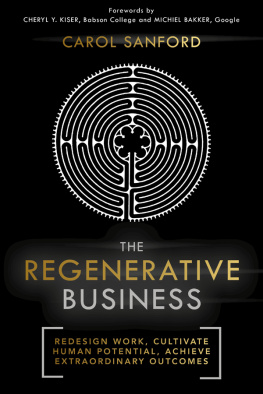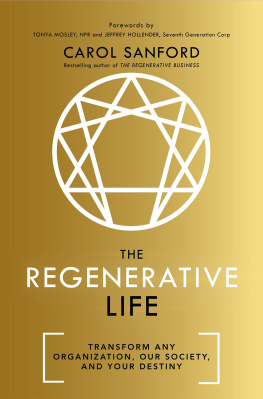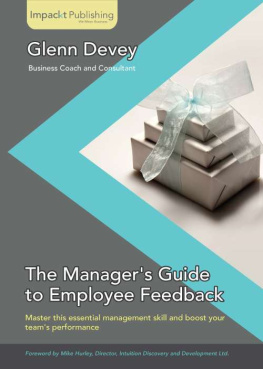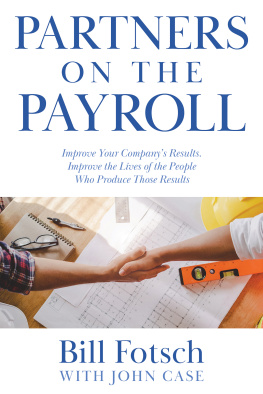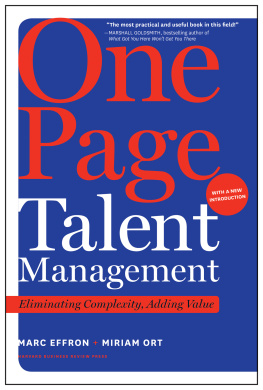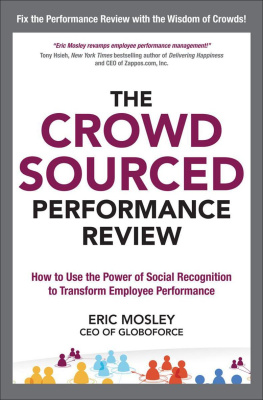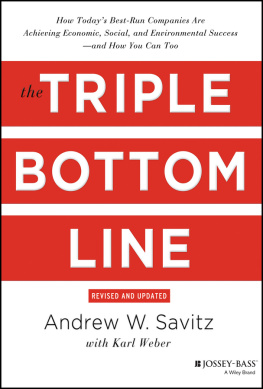This is the first book I have written without my great publisher, Nicholas Brealey. Thank goodness, I always have Kit Brewer, my dedicated and diligent personal editor, who has gone above and beyond on this work. Scott Yeager provided invaluable guidance early on about how to structure the book. A handful of my Change Agent Community members also cared enough to dig in and tell me what worked for them and what did not. Thanks in particular to Jennifer Atlee, Beatrice Ungard, and Mary Emeny. Additional thanks to Gabriel Fehrenbach and Lisa Gill from LinkedIn connections who offered straightforward and useful advice.
I also want to acknowledge the members of my Change Agent Development Community and Regenerative Business Development Community, all of whom are dedicated to their own growth in service to evolving human systems and our effects on Earth through a regenerative paradigm . They challenge and inspire me every day.
Foreword
I think the intentions of feedback proponents are purecompared with the top-down, hardline mandates of the past, having a space for dialogue about performance is a huge step up. Performance reviews, particularly ones using 360-degree feedback from people at different levels of a company, were meant to be collaborative. But they also came out of the machine reductionist paradigm, in which the world is seen as one giant assembly line, and all you have to do is input x to produce y. Of course, the world is not so simple, and humans are not machines.
In my over twenty-five years of experience in business, Ive seen how detrimental constant feedback can be, how it chips away at our powers of discernment and the self-confidence we need to investigate and express whatever it is that makes us unique. Ive also seen what real conversations about the ways in which we approach problems or interact with our team can do, as long as they are genuine, nurture our unique essence, and empower us to build our capacity, to reach further than we thought possible. In these kinds of conversations, you cant give precise advice for how to color inside the lines, or even offer support for not thinking outside the boxyou must abandon the lines and the box in search of something completely unknown.
Treating humans like complex beings living in a complex universe makes life more complicated. It requires taking the living systems perspective, in which we view everything as alive, evolving, and connected to everything else. Though challenging, seeing the world in this way is essential at this moment, when the challenges we face are both dire and brand new. Now we have to expand our ways of thinking, to look at an immediate challenge and attempt to see it within its greater context, to consider the ripple effects of each of our actions. By pushing against the edge again and again and turning possibilities into realities, we are taking steps now to live what we have the power to imagine. For this profound insight, I have Carol Sanford to thank.
Studying with Carol Sanford has blown my world wide open. She is a contrarian in the best sense of the word, someone totally unseduced by popular opinion or standard practice. As part of her regenerative business community, I am continually surprised to find that what Ive always taken for granted as foundational isnt actually set in stone, that there is so much more complexity and potential in the world than I previously thought. This book isnt for those looking for a premade path; its for anyone who is willing to take the more treacherous path of self-reflection and continual awakening, to find their own way by going within and seeing the world anew.
Sheryl OLoughlin
CEO, REBBL Inc.,
Former CEO Clif Bar and Company,
Co-founder Plum Inc.
Executive Director of the Center for Entrepreneurial Studies,
Stanford Graduate School of Business
Preface:
Why Critique the Most Popular Practice Ever? Toxicity!
I will admit from the start that this is a contrarian view of a subject that I love to hate : Feedback. People are often shocked that I would critique something that they think must be good for them and certainly good for others, no matter how much they dislike participating in it. After all, without feedback, how would we know how others see us? How would we get better at what we do?
My answer to this is that there is a much more effective way for people to accurately assess their work, improve their performance, and raise the level of their contributionswith none of the downsides or negative side effects of feedback.
If you are a manager or someone who supports managers, you are probably always seeking ways to help people succeed and to improve your organization. You might also want to make it possible for employees to appreciate their jobs and find work more meaningful. You may believe feedback is a great tool for getting this done. This book is written to show how it actually comes close to doing the exact opposite. I also hope to demonstrate that there is a far more effective way to get the results you are looking for and it is easier than you might think.
To accomplish this, I will relate a bit of feedbacks historyhow it was developed and sold to us as a best practice , how we were fooled into believing the pitch (it happened to all of us), and why we continue to miss the forest for the trees. More importantly, I will also show you why you cannot fix the feedback process by tweaking it, training people to do a better job of it, or hiring the right people for it in the first place. The problem is innate to the process itself.
While I want to make this lesson available to more people, I do not want you to adopt my thoughts or my truth. Instead, I offer ways for you to learn to deeply examine your own and others ideas, to develop discernment, to think critically, and to take on change as a necessary and exhilarating aspect of human life. In order to clearly see the toxic nature of feedback, you will have to rigorously question my argument, reflect honestly on your own experience, and trust yourself to discern the truth. Our minds play tricks on us, and we will examine that phenomenon, too, because mind games lead us to believe in feedback. They will make it hard to let go, especially given our deep investment.
Be prepared to rethink your certainties and maybe even to forgive yourself along the wayand to forgive those who put you through craziness and exposed you to toxicity. I know this because it is what I had to do when I learned the truth about feedback. I had to forgive myself and forgive those who imposed it on me.


